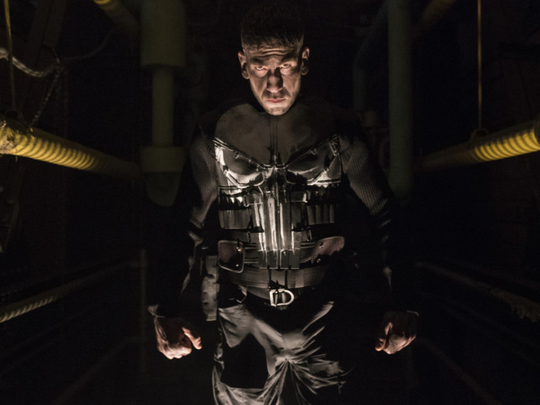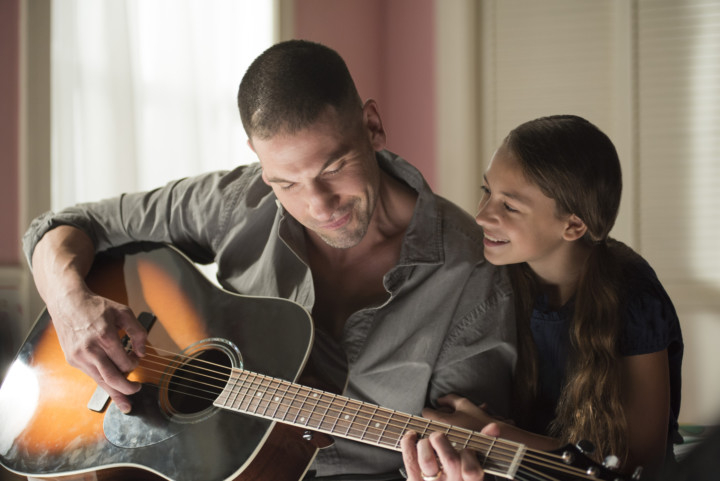
Torture, extortion, abduction and cold-blooded murder are just a few of Frank Castle’s favourite things. So just how far into the dark side can a comic book protagonist go before they’re deemed irredeemable? Is there a thick enough line between moral bankruptcy and good intentions?
Marvel’s The Punisher, out on Netflix on November 17, scrapes the surface of these questions.
The series tracks our brutal lead Castle, also known as the trigger-happy vigilante Punisher, as he attempts to avenge the murder of his wife and children with military precision. A Marine veteran, Castle will stop at nothing to bring about his own brand of justice.
Jon Bernthal, who plays the titular Punisher, still grapples with the truth of his dark character.
“Is Frank Castle that father from the suburbs who’s happy raising his kids and coaching his son and playing guitar with his daughter? Is that the happy Frank Castle?” he posits, speaking to Gulf News tabloid! on the set of the show in New York earlier this year. “Or is the happy Frank Castle the man who gets to be neck-deep in blood and guts?”
If these two versions of Castle seem to be at extreme odds with each other, it’s because they are. Things get blacker here than they did on Netflix’s Daredevil, where The Punisher made his first appearance. Given his own 13-episode series, Castle – paranoid, determined and physically imposing (Bernthal has more muscles than most humans know exist) – continues to lean into the blood-and-guts life and away from suburban utopia.
“His self-loathing grows deeper and deeper, and I think that there’s always this question of, ‘Why am I behaving the way that I am?’” Bernthal says.
Guilt is partly the answer. One of the central themes of The Punisher is that Castle blames himself, for a whole multitude of reasons, for the death of his family, and for the maladjusted way he deals with it. For lack of a better term, Bernthal says, Castle feels he deserves to be punished. He does everything in his power to squeeze the light out of himself so he can live a hollowed-out life and become one with the barrel.
But any character worth its salt leaves space for hope. Without the ability to grow, Castle’s arc would collapse in on itself.
“One of the things we’re trying to get at is that human beings can build a wall around their heart - you can build the strongest, thickest, most impenetrable wall in the world - but at the end of the day, to be human means you feel and you care and light will crack through that wall,” says Bernthal.
SIDE CHARACTERS
The Punisher can’t exist in a silo, after all. He relies on a host of other characters, starting with Micro, a tech-savvy NSA analyst, who shares common enemies with Castle. Unlike Castle, Micro is tall, shabby and book smart – the brains to Castle’s brawn.
“It’s a marriage of convenience,” says Ebon Moss-Bachrach, who plays Micro. “It’s like a partnership that sometimes flirts with being friends. Mostly, our relationship exists within the prison cellmate variety, which can be friends, enemies [or a] married couple. I mean, I’m sure there’s bromances happening in maximum security prisons across the country.”
Moss-Bachrach wasn’t crazy about Micro’s depiction in the comic books, although he quickly adds that such an admission could ‘destroy me, literally’; The Punisher, like any other Marvel project, comes with a steadfast built-in fandom. Moss-Bachrach wanted to elevate his character, though, from being a one-trick pony to a three-dimensional sidekick. It’s tough task when most of your scenes take place in a dim, decrepit underground vault with one other person.
“This is gonna be so lame,” says Moss-Bachrach, “but I really like Jon. This job would suck if he wasn’t so great, just because he’s the only person I work with. He’s funnier than you would imagine, and very hard working and smart and cares deeply about it. He’s a good leader on set”.
Actress Deborah Ann Woll agrees. She says she and Bernthal have “such affection for each other”.
“I’d pretty much agree to do anything that Jon’s doing. If I get to work with Jon, I will do it,” she says, without hesitation, when quizzed about the possibility of expanding The Punisher franchise to several seasons.
PAGING KAREN
Woll is a regular in the Marvel world. She returns from Daredevil and The Defenders as Karen Page, a former secretary at Matt Murdock’s law firm and a reporter for the New York Bulletin, with a dark history of her own.
“One of my favourite things about the relationship between Karen and Frank is that she challenges him. She’s not scared of him,” says Woll, who doesn’t deny that the two have chemistry that they’re not ready to explore.
“His whole story is about his love for his wife, his children and that family. For Karen it would feel like crossing a line. It would feel wrong to disgrace that memory,” she says.
Still, her character is firmly in Castle’s corner, poking at his conscience every once in a while. The question for Page has never been whether Castle’s methods are sound (they’re not), but whether or not they make him a monster – someone who shouldn’t be cared for.
Castle is similarly susceptible to Page’s affections. She’s one of his last standing allies.
“I’m often surprised when I’m reading these scripts about how much these people are able to penetrate [Frank’s walls],” says Bernthal. “All of a sudden, I think he’s finding himself [thinking], ‘Why would I give a [expletive] about this? But god damn it, I do.’”
Bernthal refers to these moments of nurture and vulnerability as ‘feeding the beast’, a term he borrowed from a Navy Seal friend. It labels the process of quietening the beast by making sure it’s satiated, although that doesn’t change the beast’s underlying nature. As Bernthal notes, “just because it’s quiet, doesn’t mean it’s not there.”
DARKEST TIMELINE
Woll, much like Bernthal, was able to lean into the things that made her uncomfortable about her character throughout the series. That wasn’t always the case on Daredevil, a show she describes as “a bit more of a courtroom drama with some really fun ninja stuff that happens in the dark somewhere”.
The Punisher lives more in the nitty-gritty, tackling issues of veteran rights and post-traumatic stress disorder.
“Matt [Murdock] has this really stingy thing about not killing people, which Karen has already made a mess of in her life,” Woll quips. “There’s something about Frank where she doesn’t have to be ashamed of her darkest, deepest side of herself.”
Of course, it wouldn’t be the Punisher “without some horrible mutilating of terrible, bad people”, says Woll, or as Moss-Bachrach puts it, “the show is kind of universal and democratic; Frank Castle, The Punisher, is an equal opportunity murderer. He kills everybody.”
Some may nevertheless be conservative about how much bone-breaking violence they’re willing to stomach, particularly in today’s sociopolitical climate. Back in the world of fiction, Bernthal describes the comic book audience as “an unbelievably educated, mature, smart audience” that enjoys watching boundaries being pushed.
“I have never met anybody who says, ‘Hey, I wish you guys would step off the gas. I wish you would pull back, I wish you would be a little less violent, a little less real,’” says Bernthal. “I’ve only felt encouragement and people begging me, ‘Push harder, go stronger.’ That’s all I try to do here.”
Don’t miss it!
The Punisher hits Netflix on November 17.














